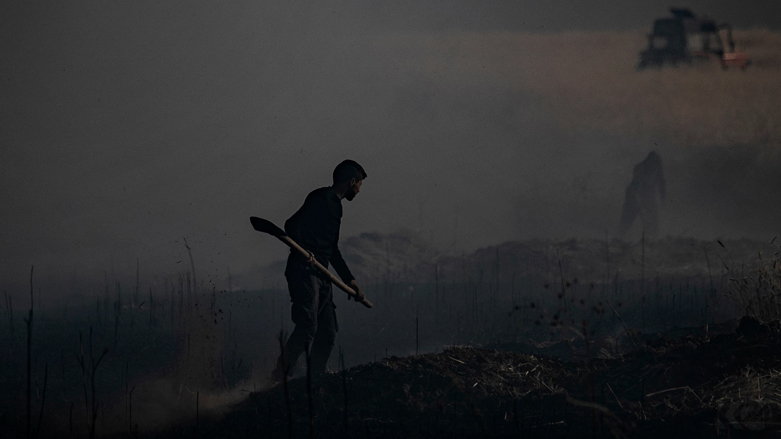ERBIL (Kurdistan 24) – Major fires tore through hundreds of acres of wheat and barley crops across multiple parts of Iraq’s disputed Kirkuk province on Thursday, according to an official document, adding to a series of similar incidents taking place across the country in recent weeks.
An Iraqi Civil Defense Department report listing all the known fire outbreaks between April 21 and May 14 counted 88 incidents in total. The top affected areas are as follows: 25 took place in Salahuddin province, 15 in Wasit, 14 in Diyala, and nine in Babil.
Among the causes, the report claimed, accidental sources such as electrical fires or those sparked by harvester machines or discarded cigarette butts, deliberate arson by landowners—potentially to seek government compensation—, terrorist attacks by members of the so-called Islamic State, and private or tribal disputes.
Most of them, some 29 blazes, were categorized as electrical fires. Seventeen more are still under investigation, and one in Diyala province’s disputed city of Khanaqin that destroyed roughly seven acres of crops is confirmed to have been an “act of terror.”
The provinces with the highest total area sustaining damage were Diyala and Kirkuk provinces, each losing close to 270 acres of land, or about a square kilometer, according to the government report. The high number in Kirkuk comes from only four such incidents. Comparison with previous civil defense data shows that close to 250 acres in Kirkuk burnt on Thursday.
Fires in disputed areas
Both Kirkuk and Diyala are either entirely or partially disputed between the Kurdistan Regional Government (KRG) and the federal Iraqi government. These areas, as well as other apparently vulnerable parts of the country, have witnessed a fresh uptick in terrorist attacks throughout the holy month of Ramadan.
The Islamic State claimed responsibility for fires in Diyala’s Khanaqin district on Thursday. In the past week, a Kurdish military commander and an Iraqi official have previously accused the terrorist organization of being behind at least some of these incidents.
A security source told Kurdistan 24 on Friday that the latest Kirkuk fires broke out in Zanqar and Ali al-Saray villages—home to the mostly-Kurdish Kakai religious minority—south of the town of Daquq.
“The fire turned the crops there to ashes,” he said.
An improvised explosive device blew up at the site just as a unit of firefighters arrived to put out a fire in Qosh Qaya village, another area where Islamic State cells are still active. The security source who shared the information said that the incident resulted in no casualties.
The source further noted the areas where the fires broke out are located in a region that has long been the site of Islamic State attacks, as well as renewed activity, indicating that it was likely that the terrorist organization may have been involved.
One Zanqar farmer on Friday stressed the precarity of the situation in the region when speaking to Kurdistan 24. “There is a security vacuum in our area and our lives are in danger,” he said. “When our crops burn, we cannot go tend to the fires for fear of traps and threats by Da’esh [ISIS] gunmen.”
In recent months, Islamic State remnants have upped their activities across the country, most notably in disputed territories, targeting and killing dozens of civilians and members of the security forces.
Kurdish government and military officials have routinely stated that Erbil and Baghdad need to improve their coordination and cooperation in these areas to combat the terrorist organization effectively. A Kurdistan Region Peshmerga Ministry delegation will visit Baghdad for bilateral talks on security-related files, a ministry official told local media on Monday.

